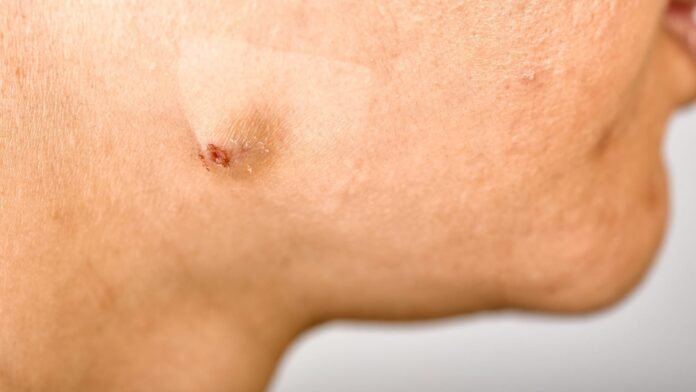Today, I’d like to discuss cystic acne, a persistent and often painful skin condition. Although this type of acne can be particularly challenging, it can be managed with the proper knowledge and skincare routine.
Let’s explore cystic acne, its causes, and how to treat and prevent it effectively.
What is cystic acne?
Cystic acne is a severe form of acne that causes large, inflamed cysts or nodules on the skin. Unlike ordinary pimples, which usually form on the skin’s surface, cystic acne develops on the deeper layers of the skin. These deep-rooted blemishes are typically red and painful to touch.
What causes cystic acne?
Acne is a complex skin condition with multiple causes, and cystic acne is no exception. Here are some common factors that cause cystic acne:
- Hormonal changes: Fluctuations in hormone levels, such as during puberty, pregnancy, menstruation, or menopause, can increase oil production and lead to cystic acne. This is why teenagers and women who experience hormonal changes are often affected.
- Genetics: If your parents or siblings have a history of cystic acne, you may be more likely to develop it.
- Diet: Some studies suggest a high intake of dairy products, processed foods, and sugar can worsen acne symptoms.
- Stress: Chronic stress can lead to an increase in the hormone cortisol, which triggers inflammation and leads to cystic acne.
- Skincare: Using heavy or pore-clogging skin care products can also cause cystic acne, especially if you have sensitive skin.
You may have heard some myths about what causes cystic acne, such as poor hygiene, chocolate, sex, or eating fatty foods. However, there is no evidence to support these claims. Cystic acne is mainly caused by internal factors, as described above.
Recognizing cystic Acne: What does it look and feel like?
LCystic acne is characterized by large red, painful bumps under the skin’s surface. Unlike typical papules, these cysts do not grow out and can take weeks or months to heal.
They may feel like induration and are soft to the touch. It is crucial to recognize symptoms early, begin appropriate treatment, and minimize the risk of scarring.
Where does cystic acne appear?
These cysts usually appear on the face, especially the cheeks, forehead, and chin. However, they can also occur on the back, chest, shoulders, and upper arms.
These areas have a higher concentration of oil-producing glands, making them more prone to outbreaks. If you frequently experience cystic acne in these areas, it may indicate an underlying hormonal imbalance.
How to treat cystic acne
Controlling cystic acne can be challenging, but it is possible with a comprehensive skincare routine and some lifestyle changes. Here are some effective treatment options:
Over-the-counter option
- Benzoyl peroxide: Helps kill bacteria and reduces inflammation.
- Salicylic acid: Unclogs pores and exfoliates.
- Retinoids: Promote cell renewal and prevent clogged pores.
Prescription options
- Oral antibiotics: Reduce bacteria and inflammation in the body.
- Isotretinoin: An effective treatment for severe cystic acne, usually used when other treatments have failed.
- Hormone therapy: Birth control pills or anti-androgen medications can help regulate the hormones that cause acne.
- Corticosteroid injections: Injectable corticosteroids can reduce inflammation and speed up the healing process of large cysts.
How to prevent cystic acne
While you may not be able to prevent cystic acne completely, you can take the following steps to reduce its occurrence:
- Gentle cleaning: Avoid heavy scrubbing or harsh cleaning products, which can irritate the skin and cause excess oil production.
- Maintain a healthy diet: Limit your dairy, processed foods, and sugar intake. Instead, focus on eating a balanced diet of fruits, vegetables, and whole grains.
- Try stress-reducing activities: Relaxation techniques such as meditation, yoga, or deep breathing can help manage stress levels and reduce the risk of breakouts.
- Do not touch your face: Do not touch your face throughout the day to prevent the transfer of bacteria and oils from your hands to your skin.
- Please don’t sleep with your makeup on: Be sure to remove it before bed, as removing it can clog pores and lead to breakouts.
- See a professional: If over-the-counter treatments don’t work, consult a dermatologist for professional guidance and treatment.
Prevent acne scars
Preventing scarring is an essential aspect of managing cystic acne. Here are some practical tips and tricks:
- Don’t pop cysts: While it may sound tempting, popping or poking your cystic acne can leave scars and even spread bacteria, leading to more breakouts.
- Avoid excessive sun exposure: Exposure can darken scars and make them more visible. Always wear sunscreen to protect your skin when you go outside.
Skin care procedures for cystic acne: Best practices
A consistent and gentle skincare routine can make a significant difference in managing cystic acne. Here’s a simple but effective regimen:
- Cleanser: First, use a gentle, non-foaming cleanser to remove impurities without peeling the skin.
- Toner: Use a toner with soothing ingredients like witch hazel or chamomile to relieve inflammation.
- Serum: Add niacinamide or hyaluronic acid serum to maintain moisture and strengthen the skin barrier.
- Moisturizer: Choose an oil-free, non-comedogenic moisturizer that hydrates your skin without clogging pores.
- Spot treatment: Targeted treatment with benzoyl peroxide or salicylic acid directly on the cyst to reduce the size and inflammation of the cyst.
- Sunscreen: End your morning routine with a lightweight, broad-spectrum sunscreen to protect your skin from UV damage.
- Night care: Use retinoids at night to promote cell renewal and prevent clogged pores. If prescribed by a dermatologist, follow their instructions.
Final thought
Cystic acne is a challenging skin condition, but with the right approach and treatment, it can be effectively controlled. Suppose you are struggling with cystic acne and need personalized advice or treatment. In that case, you can make an appointment with me at the Kim Gallo Beauty Center. Our bespoke skincare treatments are designed to address your specific skin issues and help you achieve cleaner, healthier skin.
Remember, you are not alone on this journey. With the right knowledge and support, you can take control of your skin and feel empowered about your appearance. Let’s awaken your natural beauty together!






